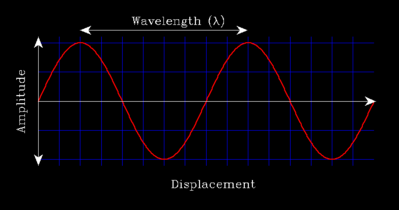< Back to Index
Wavelength
A wavelength is classified as the distance between successive crests and troughs
of waves, crests being an arc shape, trough being a bowl shape. It is given by the
equation:
https://www.nde-ed.org/EducationResources/CommunityCollege/Ultrasonics/Graphics/wavelength%20formula.jpg
The SI unit for wavelength is meters (m).
Frequency
The frequency is how often the wavelength completes itself. It is given by the
equation:
f = 1/T
http://dawnofthenewage.com/wp-content/uploads/2013/01/green-frequency-wavy-lines-26422.jpg
where f is the frequency and T is the period of the wavelength. The SI unit for
frequency is Hertz (Hz).
Amplitude
Amplitude is the maximum distance moved from something that vibrates. As shown
in the diagram for a wave to the right, the amplitude is the highest and lowest
y-coordinate. It is given by the equation:
A = d/f http://astronomy.swin.edu.au/cms/cpg15x/albums/scaled_cache/wavelength_example-400x210.png
where A is the amplitude, d is the displacement, and f is the frequency. The SI unit for amplitude is meters (m).
Vibrations
Vibrations are the oscillating motions of some sort of elastic body such as a piano string that has a force pushed against it from its equilibrium position. The strength of the vibrations and the amount of oscillations it undergoes are determined by the tension on the elastic body and the force applied to it. If there are no other external forces that act on the elastic body, it will eventually stop vibrating as its energy begins to dissipate over time in a process called damping. According to Newton's First Law of Motion, the elastic body will not instantly stop vibrating as soon as it gets back to its equilibrium position, however, it will eventually get back to that position because of the restoring force on the elastic body, which gradually slows it down.
Piano Strings
The strings in a piano vibrate in order to produce sound. The frequency of the vibrations determine the pitch of the sound that is produced by the strings. In order to alter the frequency of the strings, the widths, the lengths, and the tension forces on the strings are changed. Wider, lengthier strings are used to produce deeper sounds while thinner, shorter strings with high tension forces are used to produce higher tones.
Frequency Chart for Sounds

